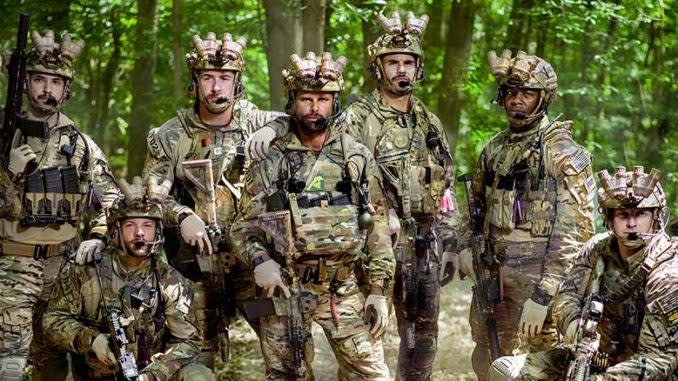‘Six’: Trying to Do SEAL Team 6 Proud

History Channel’s new scripted series Six, premiering Wednesday, attempts two things at once. It wants to be a realistic portrayal of how Navy SEAL Team 6 has operated in various operations overseas. It also wants to be a drama that will appeal to a broad, diverse audience. It tackles this dual goal with admirable skill that sometimes doesn’t live up to the talent on-screen and behind the scenes.
The show stars Justified’s Walton Goggins as Richard “Rip” Taggart, the rip-snortin’-est soldier you can imagine. We see him as the leader of a SEAL team during the war in Afghanistan and witness his take-no-prisoners attitude and actions. The latter are bloody and brutal. As Goggins told my colleague Mandi Bierly with admirable bluntness, “Rip is a war criminal. You can say what you want to say, but that’s what he is, so let’s start from the truth.” And while Goggins went on to say that we’ll see his “journey of personal redemption,” it’s the brutal aspect of Rip that makes him a compelling figure to build a TV series around, mostly because so many dramas constructed around our military tend to soft-pedal the morally gray, or downright immoral, stuff.
Related: History’s ‘Six’: 5 Things to Know About the Navy SEAL Drama
The first episode quickly jumps two years ahead. We see Rip in Nigeria, as a spiritually bankrupt gun-for-hire. He’s taken captive — along with an American businessman and a local school teacher (played by Nondumiso Tembe) and her young students — by the terrorist group Boko Haram. His former SEAL teammates end up engaging in a rescue mission. These scenes — in fact, all the overseas scenes — are shot by director Lesli Linka Glatter (a great craftsperson who’s done excellent work on everything from Homeland to Gilmore Girls) with a kinetic excitement that complements the intense performances, especially by Goggins.
But Six also takes you stateside — and not just stateside, but to suburbia, where (no surprise) these men, in their off-duty hours, do not have an easy time making marriages and child-rearing work, nor do they find contentment in tinkering in the garage or flipping burgers on the backyard grill. The show tries very hard to give us believable female characters in this context, but I’m afraid the best Six can do is achieve a kind of high-class soap opera.
Six’s co-creators include writer David Broyles and his father, William Broyles. The latter co-created the fine 1980s Vietnam War drama China Beach, which, if you’ve ever seen the performances there by Dana Delany and Marg Helgenberger, certainly suggests that Broyles pere knows how to write for women. Still, Six is uneven in this area. When the show travels outside of America, it’s still full of macho dialogue that can be wearisome — “We’re gonna fix this because that’s what we do; we’re gonna bring Rip home!” — but it has a blend of action and moral inquisitiveness that makes the show intriguing.
Six premieres Wednesday at 10 p.m. on History.


